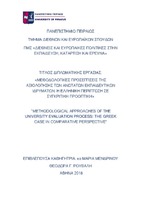Μεθοδολογικές προσεγγίσεις της αξιολόγησης των Ανωτάτων Εκπαιδευτικών Ιδρυμάτων: η ελληνική περίπτωση σε συγκριτική προοπτική
Methodological approaches of the university evaluation process: the greek case in comparative perspective

Προβολή/
Λέξεις κλειδιά
Αξιολόγηση ; Πιστοποίηση ; Συστήματα κατάταξης ; Ανώτατη Εκπαίδευση ; TuningΠερίληψη
Τις τελευταίες δεκαετίες η αξιολόγηση της ανώτατης εκπαίδευσης έχει διαφοροποιηθεί ριζικά τόσο ως προς τους σκοπούς και τις μεθόδους όσο και ως προς το επίπεδο σχεδιασμού και εφαρμογής της. Η ανάδυση της «ψηφιακής κοινωνίας» και της δικτύωσης, οι μορφές συγκρότησης της διεθνούς οικονομίας, η κινητικότητα, η αποδυνάμωση του έθνους-κράτους με παράλληλη ενίσχυση νέων μορφωμάτων πολιτειακής οργάνωσης αλλά και η αυξανόμενη αλληλεπίδραση σε παγκόσμιο επίπεδο δημιουργούν την ανάγκη για ένα νέο ρυθμιστικό πλαίσιο για την ανώτατη εκπαίδευση. Μέσα σε αυτό το πλαίσιο, η παραδοσιακή προσέγγιση της διασφάλισης ποιότητας με έντονα εθνικά και ιστορικά χαρακτηριστικά έχει ξεπεραστεί. Η αξιολόγηση τοποθετείται σε ένα διεθνοποιημένο περιβάλλον που απαιτεί εναρμόνιση των εθνικών συστημάτων και την ικανότητα λειτουργίας τους σε ένα υπερεθνικό πλαίσιο. Στην παρούσα εργασία θα εξεταστούν οι δύο βασικές τάσεις στη διαμόρφωση των συστημάτων διασφάλισης ποιότητας και η καταγραφή των βασικών τους χαρακτηριστικών όπως εντοπίζονται στα συστήματα παγκόσμιας κατάταξης, στον Ευρωπαϊκό Χώρος Ανώτατης Εκπαίδευσης (ΕΧΑΕ) και στην ελληνική νομοθεσία. Διαπιστώνεται ότι ο συντονισμός και η εναρμόνιση των συστημάτων αξιολόγησης είναι απαραίτητα στοιχεία μίας ανοιχτής και εξωστρεφούς τριτοβάθμιας εκπαίδευσης. Οι αλλαγές που θα προκύψουν δεν θα πρέπει, ωστόσο, να αποκλίνουν ή να παραβλέπουν την ιστορική και θεσμική κουλτούρα μίας χώρας ή ενός εκπαιδευτικού συστήματος.


